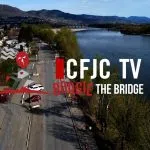
Long-term supports needed to brace for impact of more residential school site discoveries: FNHA
KAMLOOPS — The discovery of hundreds of child-burial sites near the former Kamloops Indian Residential School has had a far-reaching impact — nationally, and mentally for residential school survivors, their families and communities.
In response, the First Nations Health Authority (FNHA) has implemented free online and phone supports for Tk’emlups specifically, and the rest of B.C. Given the amount of calls and inquiries, FNHA CEO Richard Jock says they will be boosting services for as much 24/7 access as possible and improving the phone line capacity.
“We’ve had a tremendous uptick in requests for support,” Jock told CFJC Today. “But also in each of the services we’re seeing as many as 700 calls a week from outside the province.”


